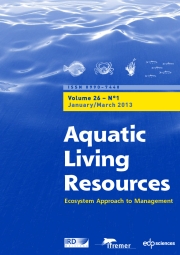Crossref Citations
This article has been cited by the following publications. This list is generated based on data provided by
Crossref.
Wang, Xuefang
Chen, Yong
Truesdell, Samuel
Xu, Liuxiong
Cao, Jie
Guan, Wenjiang
and
Buckel, Jeffrey
2014.
The Large-Scale Deployment of Fish Aggregation Devices Alters Environmentally-Based Migratory Behavior of Skipjack Tuna in the Western Pacific Ocean.
PLoS ONE,
Vol. 9,
Issue. 5,
p.
e98226.
Hobday, Alistair J.
Bell, Johann D.
Cook, Timothée R.
Gasalla, Maria A.
and
Weng, Kevin C.
2015.
Reconciling conflicts in pelagic fisheries under climate change.
Deep Sea Research Part II: Topical Studies in Oceanography,
Vol. 113,
Issue. ,
p.
291.
Bush, Simon R.
and
Mol, Arthur P.J.
2015.
Governing in a placeless environment: Sustainability and fish aggregating devices.
Environmental Science & Policy,
Vol. 53,
Issue. ,
p.
27.
Pilling, Graham M.
Harley, Shelton J.
Nicol, Simon
Williams, Peter
and
Hampton, John
2015.
Can the tropical Western and Central Pacific tuna purse seine fishery contribute to Pacific Island population food security?.
Food Security,
Vol. 7,
Issue. 1,
p.
67.
LEE, Mi Kyung
LEE, Sung Il
KIM, Zang Geun
KU, Jeong Eun
PARK, Hee Won
and
YOON, Sang Chul
2015.
The fishing characteristics of Korean tuna purse seine fishery in the Pacific Ocean.
Journal of the Korean Society of Fisheries Technology,
Vol. 51,
Issue. 3,
p.
414.
Evans, K.
Young, J.W.
Nicol, S.
Kolody, D.
Allain, V.
Bell, J.
Brown, J.N.
Ganachaud, A.
Hobday, A.J.
Hunt, B.
Innes, J.
Gupta, A. Sen
van Sebille, E.
Kloser, R.
Patterson, T.
and
Singh, A.
2015.
Optimising fisheries management in relation to tuna catches in the western central Pacific Ocean: A review of research priorities and opportunities.
Marine Policy,
Vol. 59,
Issue. ,
p.
94.
Weng, Kevin C.
Glazier, Ed
Nicol, Simon J.
and
Hobday, Alistair J.
2015.
Fishery management, development and food security in the Western and Central Pacific in the context of climate change.
Deep Sea Research Part II: Topical Studies in Oceanography,
Vol. 113,
Issue. ,
p.
301.
LEE, Mi-Kyung
LEE, Sung-Il
LEE, Chun-Woo
KIM, Zang-Geun
and
KU, Jeong-Eun
2016.
Changes in fishing characteristics and distributions of Korean tuna purse seine fishery by oceanographic conditions in the Pacific Ocean.
Journal of the Korean Society of Fisheries Technology,
Vol. 52,
Issue. 2,
p.
149.
Groeneveld, Rolf A.
and
Quaas, Martin F.
2016.
Promoting selective fisheries through certification? An analysis of the PNA unassociated-sets purse seine fishery.
Fisheries Research,
Vol. 182,
Issue. ,
p.
69.
Olson, R.J.
Young, J.W.
Ménard, F.
Potier, M.
Allain, V.
Goñi, N.
Logan, J.M.
and
Galván-Magaña, F.
2016.
Vol. 74,
Issue. ,
p.
199.
Moreno, G.
Dagorn, L.
Capello, M.
Lopez, J.
Filmalter, J.
Forget, F.
Sancristobal, I.
and
Holland, K.
2016.
Fish aggregating devices (FADs) as scientific platforms.
Fisheries Research,
Vol. 178,
Issue. ,
p.
122.
LEE, Mi-Kyung
LEE, Sung-Il
LEE, Chun-Woo
KIM, Doo-Nam
and
KU, Jeong-Eun
2016.
Study on effects and strategies of Korean tuna purse seine fishery affected by conservation management measures of Western and Central Pacific Fisheries Commission.
Journal of the Korean Society of Fisheries Technology,
Vol. 52,
Issue. 3,
p.
197.
Tidd, Alex
Brouwer, Stephen
and
Pilling, Graham
2017.
Shooting fish in a barrel? Assessing fisher‐driven changes in catchability within tropical tuna purse seine fleets.
Fish and Fisheries,
Vol. 18,
Issue. 5,
p.
808.
Houssard, Patrick
Lorrain, Anne
Tremblay-Boyer, Laura
Allain, Valérie
Graham, Brittany S.
Menkes, Christophe E.
Pethybridge, Heidi
Couturier, Lydie I.E.
Point, David
Leroy, Bruno
Receveur, Aurore
Hunt, Brian P.V.
Vourey, Elodie
Bonnet, Sophie
Rodier, Martine
Raimbault, Patrick
Feunteun, Eric
Kuhnert, Petra M.
Munaron, Jean-Marie
Lebreton, Benoit
Otake, Tsuguo
and
Letourneur, Yves
2017.
Trophic position increases with thermocline depth in yellowfin and bigeye tuna across the Western and Central Pacific Ocean.
Progress in Oceanography,
Vol. 154,
Issue. ,
p.
49.
Scutt Phillips, Joe
Pilling, Graham M.
Leroy, Bruno
Evans, Karen
Usu, Thomas
Lam, Chi Hin
Schaefer, Kurt M.
Nicol, Simon
and
Hewitt, Judi
2017.
Revisiting the vulnerability of juvenile bigeye (Thunnus obesus) and yellowfin (T. albacares) tuna caught by purse-seine fisheries while associating with surface waters and floating objects.
PLOS ONE,
Vol. 12,
Issue. 6,
p.
e0179045.
Emery, Timothy J.
Noriega, Rocio
Williams, Ashley J.
Larcombe, James
Nicol, Simon
Williams, Peter
Smith, Neville
Pilling, Graham
Hosken, Malo
Brouwer, Stephen
Tremblay-Boyer, Laura
and
Peatman, Thomas
2018.
The use of electronic monitoring within tuna longline fisheries: implications for international data collection, analysis and reporting.
Reviews in Fish Biology and Fisheries,
Vol. 28,
Issue. 4,
p.
887.
Scutt Phillips, Joe
Sen Gupta, Alex
Senina, Inna
van Sebille, Erik
Lange, Michael
Lehodey, Patrick
Hampton, John
and
Nicol, Simon
2018.
An individual-based model of skipjack tuna ( Katsuwonus pelamis ) movement in the tropical Pacific ocean.
Progress in Oceanography,
Vol. 164,
Issue. ,
p.
63.
CEZAR, RODRIGO FAGUNDES
2018.
The Politics of ‘Dolphin-Safe’ Tuna in the United States: Policy Change and Reversal, Lock-in and Adjustment to International Constraints (1984–2017).
World Trade Review,
Vol. 17,
Issue. 4,
p.
635.
Lezama‐Ochoa, Nerea
Murua, Hilario
Ruiz, Jon
Chavance, Pierre
Delgado de Molina, Alicia
Caballero, Ainhoa
and
Sancristobal, Igor
2018.
Biodiversity and environmental characteristics of the bycatch assemblages from the tropical tuna purse seine fisheries in the eastern Atlantic Ocean.
Marine Ecology,
Vol. 39,
Issue. 3,
Scutt Phillips, J
Escalle, L
Pilling, G
Sen Gupta, A
and
van Sebille, E
2019.
Regional connectivity and spatial densities of drifting fish aggregating devices, simulated from fishing events in the Western and Central Pacific Ocean.
Environmental Research Communications,
Vol. 1,
Issue. 5,
p.
055001.


